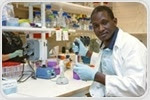| |  A new report published on the 8th of September 2019 by The Lancet Commission says that mosquito-borne malaria that kills thousands across the world could be eradicated by 2050. A team of 41 researchers including those that are experts on malaria, scientists, health policy experts as well as economists came together to create this exhaustive report on current status of malaria and its future around the world. A new report published on the 8th of September 2019 by The Lancet Commission says that mosquito-borne malaria that kills thousands across the world could be eradicated by 2050. A team of 41 researchers including those that are experts on malaria, scientists, health policy experts as well as economists came together to create this exhaustive report on current status of malaria and its future around the world. | |
|
| |  The first detailed map of individual malaria parasite behavior across each stage of its complicated life cycle has been created by scientists. Researchers at the Wellcome Sanger Institute and their collaborators used advanced single-cell technology to isolate individual parasites and measure their gene activity. The first detailed map of individual malaria parasite behavior across each stage of its complicated life cycle has been created by scientists. Researchers at the Wellcome Sanger Institute and their collaborators used advanced single-cell technology to isolate individual parasites and measure their gene activity. | |
|
| |  Human Ebola epidemics, like the current outbreak in the Democratic Republic of Congo, are known to start from a contact with wildlife infected with Ebola virus. In the early 2000s a series of such outbreaks in Central Africa began from different infected animal sources. In response, WCS (Wildlife Conservation Society) and NIH (National Institutes of Health) scientists partnered with the Republic of Congo Ministry of Health to develop a low-cost educational outreach program and surveillance system for wildlife mortality that has continued now for over a decade. Human Ebola epidemics, like the current outbreak in the Democratic Republic of Congo, are known to start from a contact with wildlife infected with Ebola virus. In the early 2000s a series of such outbreaks in Central Africa began from different infected animal sources. In response, WCS (Wildlife Conservation Society) and NIH (National Institutes of Health) scientists partnered with the Republic of Congo Ministry of Health to develop a low-cost educational outreach program and surveillance system for wildlife mortality that has continued now for over a decade. | |
|
| |  A little bit of norovirus - the highly infectious microbe that causes about 20 million cases of food poisoning in the United States each year - goes a long way. Just 10 particles of the virus can cause illness in humans. A little bit of norovirus - the highly infectious microbe that causes about 20 million cases of food poisoning in the United States each year - goes a long way. Just 10 particles of the virus can cause illness in humans. | |
|
| |  Hepatitis C is a viral infection that affects the liver and is usually acquired from infected blood. Formerly called non-A, non-B hepatitis, this infection causes inflammation of the liver, sometimes causing serious liver damage. Hepatitis C is a viral infection that affects the liver and is usually acquired from infected blood. Formerly called non-A, non-B hepatitis, this infection causes inflammation of the liver, sometimes causing serious liver damage. | |
|
| |  Pneumonia is a lung infection, filling up the alveoli with pus and fluid. At present, it’s the leading cause of death among children. The lung infection accounts for 15 percent of all deaths in children below five years old, killing more than 800,000 children in 2017 alone. Pneumonia is a lung infection, filling up the alveoli with pus and fluid. At present, it’s the leading cause of death among children. The lung infection accounts for 15 percent of all deaths in children below five years old, killing more than 800,000 children in 2017 alone. | |
|
| |  The number of new HIV diagnoses in the UK has fallen to a record low since 2000, according to a new report by Public Health England. The number of new HIV diagnoses in the UK has fallen to a record low since 2000, according to a new report by Public Health England. | |
|
| |  A new project in Northern Australia will focus on how Australia can better protect and rapidly respond to the growing global risk of emergent infectious diseases which can spread to humans through animals and insects. A new project in Northern Australia will focus on how Australia can better protect and rapidly respond to the growing global risk of emergent infectious diseases which can spread to humans through animals and insects. | |
|
| |  Scientists have used the gene-editing technology CRISPR in an attempt to cure a person infected with HIV, with some success. Scientists have used the gene-editing technology CRISPR in an attempt to cure a person infected with HIV, with some success. | |













































No hay comentarios:
Publicar un comentario